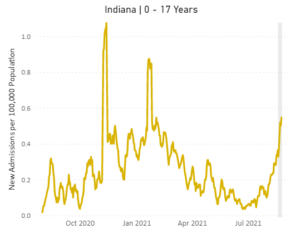COVID-19 Cases Among Adolescents
August means returning to school for many children. This year, many schools are attempting to return in-person, which is proving challenging with the accelerated spread of the COVID-19 Delta variant (97.6% of samples in August). Cases among adolescents (0 – 17 years of age) are as high as they’ve been since January 2021. With other respiratory viruses circulating in schools, it’s the perfect storm for illness spreading in schools.

New admissions of patients with confirmed COVID-19 per 100,000 population by age group, Indiana, Aug 1 2020 – Aug 24, 2021
Adolescent Vaccination & Masking
Although the FDA approved the Pfizer COVID-19 vaccine on August 23, it is still only approved for use in individuals 16 years of age or older, and is available under EUA for the use in individuals 12 through 15 years of age. Children under the age of 12 are still ineligible to receive any vaccination against COVID-19. Without vaccines, the most efficacious intervention to reduce spread of COVID-19 among children is masks. Gov. Eric Holcomb has given his support to the growing number of school districts that are issuing mask mandates, but it has been emphasized that there will be no state mandate on masks in schools. Local leaders will continue to make those decisions, despite a recommendation from the U.S. Centers for Disease Control and Prevention that K-12 schools resume masking.
Hospital Capacity
Even in Indiana, children’s hospitals are nearing capacity to treat patients with COVID-19 infection. Dr. Kate Dutkiewicz, Medical Director at Beacon Children’s Hospital, one of three children’s hospitals in northern Indiana, describes what this spike in pediatric COVID-19 admissions is doing to hospital capacity.
If 20 percent of children in our area would get COVID and require hospitalization, that would mean 1,400 children when we only have about 100 available pediatric beds. Depending on the severity of their illness, and the amount of time they’re in the hospital, three-quarters of our beds could be filled with COVID patients.
Why is this so scary when pediatrics patients are very unlikely to die of COVID based on what we’ve see for the last 18 months? Because kids who have other problems that can be very serious — like RSV, flu, cancer, sickle cell disease, appendicitis, sepsis, diabetes, seizures, or sustain injuries from car accidents and near drownings, or have any other illnesses that routinely rely on the specialized care provided by our hospitals — literally may not be able to get in here, or anywhere.
Children’s hospitals in Indianapolis are seeing record numbers of kids with COVID, and the Delta variant is impacting the number of pediatric patients requiring hospitalization in Chicago. Some are taking patients from Louisiana and Texas because there are no pediatric beds available in those states. Adding to this concern, there is also currently a nationwide shortage of nurses and medical personnel that is affecting hospitals everywhere, which makes it particularly difficult to find specialized people to staff pediatric beds.
At Riley Hospital for Children in Indianapolis, there are record number of children in the emergency department for treatment of COVID-19. On Thursday, August 26, IU Health systems announced that they will be suspending 50% of all elective surgeries to provide relief to staff who are needed for treatment of COVID-19 patients.
Testing in Schools
Indiana Department of Health plans to announce a partnership next month with an agency that can provide COVID testing in schools. IDOH is even calling back the National Guard for help at testing sites due to the significant increase in demand for testing. State Health Commissioner Dr. Kristina Box said,
The demand for testing skyrocketed right about the same time that many of our testing sites across the state were kind of decreasing the amount of hours that they were available to do testing, which we know has resulted in some prolonged waits and frustrations.
A big part of that is kids,” said Box. “Kids that are symptomatic whose parents are concerned and want them tested; kids who have been sent home because they had a headache or a stomachache and in order to get back into school, they need to be able to have a negative test; kids that have been quarantined because of a close contact and they weren’t masked and so they’ve been sent home, and now they want to get tested to get back into school.
